Solar Panels for Home & Commercial Use
Whether you're looking to save money on your electric bills, equip your home with battery backup, or deliver power to remote off-grid locations, SolarTown carries the right solar panels for the job.
Monocrystalline Solar Panels
These full-sized panels are the standard pick for residential and commercial solar projects. Mono solar panels come in a couple standardized sizes:
- 60-cell solar panels: approx. 3.25 by 5.5 feet
- 72-cell solar panels: approx. 3.25 by 6.5 feet
These panels offer the best mix of performance, space efficiency and cost effectiveness, making them the best choice for home solar projects.
Shop monocrystalline solar panels
High-efficiency solar panels
High-efficiency solar panels generate more production per square foot, making them ideal for projects where build space is limited. These panels come in the same form factor as our standard monocrystalline panels, but produce energy at a more efficient rate. They are perfect for squeezing as much production as possible from your system when operating under space constraints.
Shop high-efficiency solar panels
Bifacial solar panels
Bifacial solar panels feature receptors on both sides of the panel, increasing energy output and space efficiency. They are fantastic when used with a ground mount racking system to increase exposure to sunlight on both sides of the panel.
Bifacial panels are especially effective when space limitations are a concern, as they generate more production using the same form factor as mono panels.
Portable Solar Panels
Power your life on the go with our selection of portable solar panels. Ideal for RVs, camping, and boating, these panels are as versatile as you are. Most of these panels are foldable and feature a kickstand for easy setup and teardown.
For a quick grab-and-go solution to generate power on the road, check out our selection of portable solar panels:
Flexible Solar Panels
Flexible solar panels bend over backwards to squeeze solar into tight situations. If you need to install solar panels on curved, bumpy, or otherwise irregular surfaces, these flexible panels are the way to go.
These are commonly on rooftops with a lot of unusual contours or obstructions. The flexible panels can be laid over uneven surfaces where traditional solar panels would not be possible.
If flat, rigid solar panels just won't do, explore our flexible panels here:
Solar Panel Warranties
Most solar panel warranties are split into two parts: a product warranty and a performance warranty.
Product warranties guarantee against any defects with the physical manufacturing of the panel. These are typically 10-15 years.
Performance warranties guarantee the output of your panels above a certain efficiency level for the life of the panel - for example, 90% efficiency after 25 years. This would mean that a 400-watt panel would be warrantied to produce at least 360 watts (90% of its original rating) after 25 years of ownership.
Solar Panel Efficiency Ratings
High-efficiency solar panels are able to fit more production into the same form factor as other residential panels. If you have a limited amount of space to build your system, high-efficiency panels may be the solution to cover your production needs within the space available to you.
Look for panels with an efficiency rating above 20%, or simply panels with very high wattage ratings, in the monocrystalline solar panels category. With high-efficiency panels, you can get away with using fewer panels to meet your production targets.
Shop Complete Solar Kits
Going solar is simple with our all-in-one solar kits. Shop our selection of complete kits here:
- Grid-tied solar kits
- Hybrid solar kits (grid-tie with battery backup)
- Off-grid kits
Frequently Asked Questions About Solar Modules
A: A solar module, also known as a solar panel, is an electronic device made up of photovoltaic cells that convert sunlight into electricity.
A: Solar modules convert sunlight into direct current (DC) electricity through the photovoltaic effect. The solar cells in the module absorb photons from the sun's rays and knock electrons off their atoms, creating a flow of electricity.
A: A solar module is typically made up of a series of interconnected photovoltaic cells, a protective backsheet, a front glass cover, a frame, and wiring.
A: The most common types of solar modules are monocrystalline, polycrystalline, and thin-film. Monocrystalline modules are made from a single crystal of silicon and are the most efficient. Polycrystalline modules are made from multiple silicon crystals and are slightly less efficient. Thin-film modules are made from a variety of materials and are the least efficient but also the most flexible.
A: The lifespan of a solar module varies depending on the quality of the module and its maintenance, but most solar modules are designed to last for 25-30 years or more.
A: The performance of a solar module is affected by several factors, including the angle and orientation of the module, the amount of sunlight it receives, the temperature, and any shading that may occur.
A: The amount of electricity a solar module can produce depends on its size and efficiency, as well as the amount of sunlight it receives. A typical residential solar module can produce between 250 and 400 watts of electricity during peak solar hours.
A: Solar modules can be used in a wide range of weather conditions, including cloudy days. However, their performance may be affected by extreme temperatures, heavy rain or snow, and high winds.
A: Many countries offer incentives for installing solar modules, such as tax credits, rebates, and net metering programs that allow homeowners to sell excess energy back to the grid.

Questions about your solar project?
Get fast answers from real people. We'll work together to design the perfect DIY solar kit for your project. Call (866) 391-0432 for immediate assistance (M-F, 6am-4pm PST), or click below to request a custom quote.
Request a Quote
